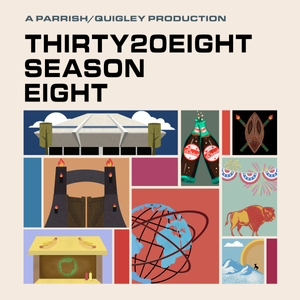
Saving the world's rarest marine mammal
04/06/21 • 32 min
2 Listeners
In this episode, we’re delving into the topic of extinction. We'll be finding out about some of the animals who are critically endangered, meeting the people trying to rescue them, and exploring species who may be able to make miraculous comebacks.
Perhaps one of the most endangered species is the vaquita, a small sea mammal with a population of less than 20. We hear from some extraordinary people weathering threats and tragedies in an attempt to bring these ‘pandas of the ocean’ back from the brink.
According to US Department of Agriculture researcher, Dr Samuel Ramsey, every discovery is built upon a discovery that came before it. Yet some of those discoveries can be found in the most unexpected of places. For Samuel, understanding his father’s health issues provided the key to discovering why honeybee populations are on the decrease.
And to finish, we’re asking one of the biggest questions in paleontology: how did birds evolve from dinosaurs? To help us explore this topic, we’ve got the help of Jingmai O’Connor whose work in China has helped shed light on the distant link between the extinct dinosaur and ballooning bird populations.
Thank you for listening to another series of the BBC Earth podcast.
As ever, we love hearing from you on social media, so do share with us your favourite episode so far or a story that amazed, surprised or moved you...
Website: www.bbcearth.com
Facebook: www.facebook.com/bbcearth/
Instagram: www.instagram.com/bbcearth/
Twitter: www.twitter.com/bbcearth
Hosted on Acast. See acast.com/privacy for more information.
In this episode, we’re delving into the topic of extinction. We'll be finding out about some of the animals who are critically endangered, meeting the people trying to rescue them, and exploring species who may be able to make miraculous comebacks.
Perhaps one of the most endangered species is the vaquita, a small sea mammal with a population of less than 20. We hear from some extraordinary people weathering threats and tragedies in an attempt to bring these ‘pandas of the ocean’ back from the brink.
According to US Department of Agriculture researcher, Dr Samuel Ramsey, every discovery is built upon a discovery that came before it. Yet some of those discoveries can be found in the most unexpected of places. For Samuel, understanding his father’s health issues provided the key to discovering why honeybee populations are on the decrease.
And to finish, we’re asking one of the biggest questions in paleontology: how did birds evolve from dinosaurs? To help us explore this topic, we’ve got the help of Jingmai O’Connor whose work in China has helped shed light on the distant link between the extinct dinosaur and ballooning bird populations.
Thank you for listening to another series of the BBC Earth podcast.
As ever, we love hearing from you on social media, so do share with us your favourite episode so far or a story that amazed, surprised or moved you...
Website: www.bbcearth.com
Facebook: www.facebook.com/bbcearth/
Instagram: www.instagram.com/bbcearth/
Twitter: www.twitter.com/bbcearth
Hosted on Acast. See acast.com/privacy for more information.
Previous Episode

The artists of the animal kingdom
In this episode, we’re displaying the most impressive artists of the animal kingdom. From tiny visual masterpieces, to animals that can dance to a beat, we’re shining a spotlight on the art that can be found in nature.
Deep in the Amazon rainforest, there’s a tiny structure that (if you’re able to spot it) catches your eye. The intricate silk henge is a mini masterpiece, and for some time nobody could say exactly what it was or why it existed. Phil Torres takes us on his journey of discovery and demystification.
Next we’re exploring whether animals can dance to a beat and, if so, why? To help us try and answer that, we hear from Henkjan Honing, professor of Music Cognition at the University of Amsterdam.
Finally, we turn our attention to Northern Australia’s great bowerbird. What can the males' elaborate constructions teach us about perspective?
Thank you for listening to another series of the BBC Earth podcast.
As ever, we love hearing from you on social media, so do share with us your favourite episode so far or a story that amazed, surprised or moved you...
Website: www.bbcearth.com
Facebook: www.facebook.com/bbcearth/
Instagram: www.instagram.com/bbcearth/
Twitter: www.twitter.com/bbcearth
Hosted on Acast. See acast.com/privacy for more information.
Next Episode

Finding what doesn't want to be found
In the final episode of series 4, we’re digging into some of the more elusive corners of our planet.
To begin, we’re on a bear hunt deep in the Bornean rainforest. Guiding us is Siew Te Wong, who is the world’s foremost authority on a bear we know very little about. The sun bear is the smallest bear in the world and, as Wong has discovered for himself, tracking them can draw up some unexpected discoveries.
Next we’re turning our attention upwards, to the sky at night. Or, to be more precise, to the sounds that come from it. Magnus Robb explores what birdsong can tell us about the extraordinary migration routes of these animals.
To end, we sit still to see the visible changes over time to our glaciers. Using past and present technology, Kieran Baxter brings to life some of the unprecedented declines in our natural world.
Thank you for listening to another series of the BBC Earth podcast.
As ever, we love hearing from you on social media, so do share with us your favourite episode so far or a story that amazed, surprised or moved you...
Website: www.bbcearth.com
Facebook: www.facebook.com/bbcearth/
Instagram: www.instagram.com/bbcearth/
Twitter: www.twitter.com/bbcearth
Hosted on Acast. See acast.com/privacy for more information.
If you like this episode you’ll love
Episode Comments
Generate a badge
Get a badge for your website that links back to this episode
<a href="https://goodpods.com/podcasts/bbc-earth-podcast-78445/saving-the-worlds-rarest-marine-mammal-12669786"> <img src="https://storage.googleapis.com/goodpods-images-bucket/badges/generic-badge-1.svg" alt="listen to saving the world's rarest marine mammal on goodpods" style="width: 225px" /> </a>
Copy




